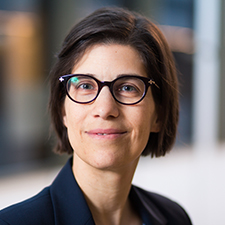 Sophia Moreau (Ph.D. Philosophy, Harvard University; B.Phil., Oxford; J.D. University of Toronto) is Professor of Law and Philosophy. Her research combines philosophical and legal scholarship and ranges from discrimination law and tort theory to problems in moral and political philosophy. Her most recent work is a book that defends an original and pluralist theory of what makes discrimination wrongful (Faces of Inequality, Oxford University Press 2020). She believes that legal theorists should engage with courts and legal practitioners: she has worked with LEAF (the Women's Legal Education and Action Fund); she has written a government report on gender identity as a prohibited ground of discrimination; and her writing on discrimination has been cited by the Supreme Court of Canada in many of their recent judgments. She is an Associate Editor of the journal Philosophy & Public Affairs; Book Reviews Editor of The University of Toronto Law Journal; and is on the Board of Law and Philosophy and the Board of CEDSPL, a European organization dedicated to furthering our understanding of discrimination. She currently holds a 5-year SSHRC Insight grant for work on tort law; and in the spring of 2022, she will be a Weinstein Fellow at Berkeley.
Sophia Moreau (Ph.D. Philosophy, Harvard University; B.Phil., Oxford; J.D. University of Toronto) is Professor of Law and Philosophy. Her research combines philosophical and legal scholarship and ranges from discrimination law and tort theory to problems in moral and political philosophy. Her most recent work is a book that defends an original and pluralist theory of what makes discrimination wrongful (Faces of Inequality, Oxford University Press 2020). She believes that legal theorists should engage with courts and legal practitioners: she has worked with LEAF (the Women's Legal Education and Action Fund); she has written a government report on gender identity as a prohibited ground of discrimination; and her writing on discrimination has been cited by the Supreme Court of Canada in many of their recent judgments. She is an Associate Editor of the journal Philosophy & Public Affairs; Book Reviews Editor of The University of Toronto Law Journal; and is on the Board of Law and Philosophy and the Board of CEDSPL, a European organization dedicated to furthering our understanding of discrimination. She currently holds a 5-year SSHRC Insight grant for work on tort law; and in the spring of 2022, she will be a Weinstein Fellow at Berkeley.
What I'm working on: Interpersonal Obligations and Subordinated Social Groups
My project looks at apparently neutral legal rules and moral concepts and explores the ways in which our interpretations of them privilege the needs and perspectives of certain social groups and inadvertently render other social groups (such as women, racial minorities, or people with disabilities) invisible in certain contexts, thereby contributing to their marginalization in our societies. The project has two sides –a legal side, and a moral side. The legal side will analyze the impact of legal rules and doctrines on already marginalized social groups, in an attempt to explore the ways in which the law silently and unintentionally exacerbates existing social disadvantages. The moral side will consider the ways in which philosophers have understood concepts that they treat as basic to our everyday moral reasoning (concepts such as “obligation” and “autonomy”) and will ask whether our interpretations of these concepts inadvertently reflect the experiences and needs of more privileged groups and fail to capture some of the different experiences of subordinated groups. In addition to critiquing our existing practices in the law and in moral philosophy, I shall explore creative solutions. Can we redraft certain problematic legal rules and rethink our interpretations of certain basic moral concepts, so that they do not render particular social groups invisible? What will the new ones look like? And who will we see, for the first time, when we try?


